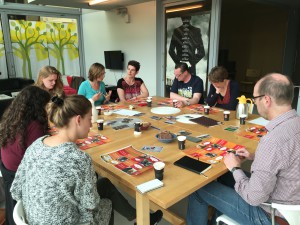Do you enjoy organizing a dialogue table, bringing different people from Utrecht together around a theme that interests you? Do you want to talk to neighbors, different cultures or generations? Do you have an idea that you want to take further, need other people for this, do you want to discuss how a dialogue can help with this? On this page you will find an overview of what is involved in preparing a dialogue. Also watch the video of the Netherlands in Dialogue on this page.
Do you want to know more? Do you have questions or need help?
Contact us at info@utrechtindialoog.nl.
Do you want to become active at Utrecht in Dialogue? View the vacancies.
Preparing a dialogue?
– Form an initiative group of people with whom you will organize the dialogue, recruit participants, search for a location, set a date and create a program. First register together for Dialogue meetings, follow a Workshop on Organizing Dialogue, and discuss what you want to achieve with the conversations. Ask Utrecht in Dialogue to help you think about the approach, finding partners, the design, the choice of themes, recruiting participants and dialogue facilitators.
– Find a pleasant place where the dialogue can take place. What you need is a quiet space with tables for 6 to 8 people where you can have a two-hour conversation with at least six participants. For example in a library, community center, sports club, gallery, living room or mosque.
– Choose an appealing conversation theme, issue that lives with people you want at the table, you want to know more about and about which you can exchange experiences.
– Make a short inspiring introduction program for your dialogue meeting. For example, you can start the dialogue by reading a poem about the theme, with a blog, column or personal story. You can also invite a music group to chat with.
– Make a promotional announcement for the dialogue agenda on the site and a flyer that makes Utrecht residents with different perspectives feel attracted. Search for suitable images here, also on Facebook and other social media. Create an event on Facebook with your partners as a co-organizer.
– Ask Utrecht in Dialoog to place the event in the dialogue agenda so that people can register online and the event is included in the newsletter. Make agreements with Utrecht in Dialogue on recruitment, distribution of the flyer to residents, directly, via partners and social media. Make a press release and post the event in various online calendars.
– Search for dialogue-trained dialogue counselors in consultation with Utrecht.
Attract participants?
 – Invite a diverse group of men and women, young and old, starters and veterans, people with different cultural backgrounds, residents, professionals and volunteers, students, parents and teachers, customers and employees, a shopkeeper, a local agent, etc. through different channels.
– Invite a diverse group of men and women, young and old, starters and veterans, people with different cultural backgrounds, residents, professionals and volunteers, students, parents and teachers, customers and employees, a shopkeeper, a local agent, etc. through different channels.
– Make your dialogue table known in your network and neighborhood and actively recruit participants. Both personally by distributing flyers and via partners, the neighborhood newspaper, mailings, websites and social media. You can refer to information on the Utrecht website in Dialogue and Facebook. You can easily distribute the news item via social media.
– Send news releases, press releases, announcements, reports and photos to info@utrechtindialoog.nl. Or put the material directly on a shared directory. Place tables and flyers on websites, platforms and publicize tables via local networks, websites, newsletters, social media and Utrecht media. Utrecht in Dialoog has a press file and sends out a newsletter every month.
– Send messages via Facebook and Twitter with photos and the results of the dialogue in a number of quotes before, during and after the dialogue. Ask Utrecht in Dialoog to share and distribute it. If possible, also state the date of a follow-up dialogue.
A welcoming reception
 Provide an attractive, pleasant and above all quiet location. A pleasant space and something tasty ensures a good mood during the conversation. You can possibly start the dialogue by reading a poem or a personal story. You can also combine a dialogue with a meal or frame it with culture: music, word art or visual arts.
Provide an attractive, pleasant and above all quiet location. A pleasant space and something tasty ensures a good mood during the conversation. You can possibly start the dialogue by reading a poem or a personal story. You can also combine a dialogue with a meal or frame it with culture: music, word art or visual arts.
Joint closure
It is valuable to share insights with each other after the dialogue tables. You can use the back of the Utrecht nameplates in Dialogue to write down your personal insights and share them as a conclusion. You can also give something at the end, for example a poem that you have read. Finally, you can also share the proceeds from the different tables. Participants and dialogue counselors often find it pleasant if afterwards there is room for informal discussion, exchanging contact details and possibly making appointments. You can also finish sharing food in the form of a potluck.
